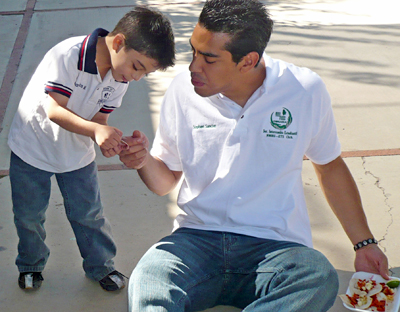
Thirteen students from New Mexico Highlands University’s one-of-a-kind Social Work Bilingual/Bicultural Master’s Program completed a successful exchange with the University of Chihuahua School of Social Work in Mexico this fall. The students experienced eight days of language, academic and cultural exchange, including a rigorous 40-hour clinical practicum, social work courses at the University of Chihuahua, and community outreach work in impoverished rural communities called colonias.
“I think in today’s day and age with the number of Spanish-speaking individuals, it’s imperative that social workers are able to speak with these individuals in their native language,” said Alfredo Garcia, dean of the NMHU School of Social Work. “Our bilingual/bicultural graduate program is our shining star in the School of Social Work. With its cutting-edge approach, the program is leading the way for the rest of the country.”
To date, 44 students have graduated with a master’s degree in bilingual social work from the 4-year-old program.
“My experience in Chihuahua really helped me gain more empathy as a social worker, and I think I’m much more prepared to work with the Mexican population,” graduate social work student Nancy Martinez said. “The social work training was intense, and I learned a lot about their culture. In Chihuahua the people make a point to enjoy life and be happy, no matter what their circumstances. They don’t have very much, but they give what they have with such an open heart. They gave us a very warm welcome and had two fiestas for us. I’m so grateful to this program,” Martinez added. “It’s awesome for anyone who wants to go into bilingual social work. It’s clinically based and the instructors are challenging but also kind and understanding.”
Three Highlands’ professors accompanied the 13 students on the University of Chihuahua exchange, including social work professor and bilingual/bicultural social work master’s program director Dolores Ortega, social work professor Rey Martinez, and Sara Harris, Spanish professor for the program and past department chair for what was previously called the Language and Literature Department at Highlands.
“The purpose of our unique program at Highlands is to educate Spanish-speaking social workers to serve Hispanic and international Latino populations,” Ortega said. “This exchange program with the University of Chihuahua is very academically rigorous, but it’s more than social work training. The program allows our students to live within the community and experience life’s problems and solutions. Our students integrate themselves into daily life, whether it’s with their host family, in the classroom, or in the community. They work side-by-side with the Mexican people and each student’s humanity is seen.”
Ortega said students in the program also experience what it’s like to help people in a community through successful advocacy. She said just one example is when two Highlands’ social work students waited for six hours in a colonia near Chihuahua to talk to the leader of a municipality about the need for a sink in the local elementary school kitchen. The students made their case well, and a new sink was found and installed the next day. On the clinical side, students work with a variety of agencies in the Chihuahua area, such as domestic violence shelters, prisons, AIDS clinics, general hospitals, and elementary schools. Ortega said that because the exchange program with the University of Chihuahua has been such a success, Mexican agencies of all kinds are requesting Highlands’ social work students for practicums. Harris said students are required to enter the bilingual social work program with a good, basic understanding of conversational Spanish and some fluency. Most of the students are Spanish heritage speakers from Northern New Mexico.
“I try to create a comfortable atmosphere in the classroom where we validate the Spanish language ability that students bring with them and build on it, increasing their confidence,” Harris said. “If our social work students can talk to someone in their own Spanish language, that person has the opportunity to express their deepest feelings. You’ve touched their soul through their language.”
Harris said when students complete the program, they are well trained to apply their Spanish language fluency and bicultural knowledge to a social work setting. The exchange with the University of Chihuahua social work program continues when its students and faculty visit the NMHU campus in April, 2009. In addition, in 2009, the Highlands School of Social Work will begin an exchange partnership with the Universidad Autonoma de Juarez. The School of Social Work’s Bilingual/Bicultural Master’s Program is catching the attention of other universities around the country. Ortega said social work faculty from Arizona State University recently visited Highlands to get ideas about how to develop a similar program at ASU. In addition, as word spreads, Ortega said more and more domestic and international employers are recruiting bilingual social workers from the graduate program, including the Behavioral Health Tarros Inc., which oversees most of the behavioral health system in Arizona. Recently, a graduate student in the program was offered a social work position with a long-term care clinic in Chihuahua, Mexico. NMHU’s School of Social Work is the oldest school of social work in New Mexico, dating back to 1974.
